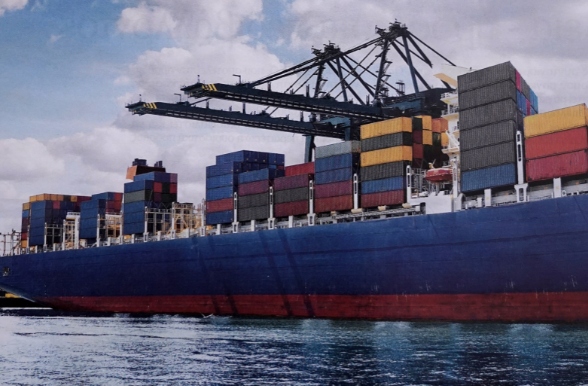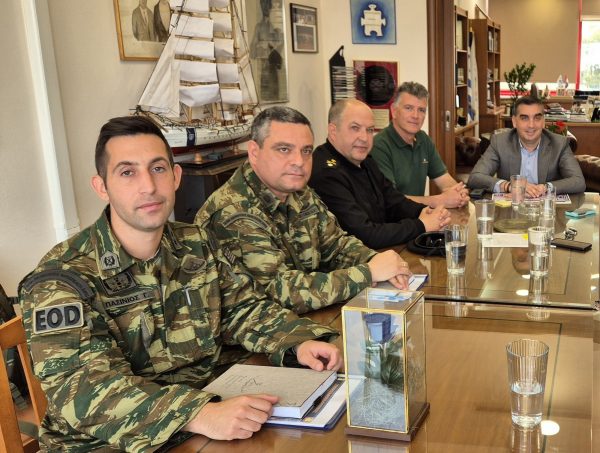
Union of Greek Shipowners: 2017-18 Annual Report
Last year, although there were many fluctuations in freight markets, the long-standing shipping recession seemed to be coming to an end. The beginning of 2018 finds our shipping industry maintaining the highest position internationally, controlling about 20% of the global fleet in dwt tonnage (including a 30% share of tankers and 22% of bulk carriers) […]
Spotlight
-

Έζησα στην Αθήνα της δεκαετίας του 1980 για έναν χρόνο - αυτό μου έμαθε ότι μπορείς να ανήκεις οπουδήποτε
-

Τα 8 πράγματα που πρέπει να κόψετε για να μην γεράσετε γρήγορα
-

Η σπαρακτική ανάρτηση Καλλιάνου για τον θάνατο του πατέρα του: «Μπανταούλη μου...»
-

Συγκέντρωση διαμαρτυρίας φοιτητών για τα ιδιωτικά πανεπιστήμια έξω από επενδυτική εταιρεία
Last year, although there were many fluctuations in freight markets, the long-standing shipping recession seemed to be coming to an end. The beginning of 2018 finds our shipping industry maintaining the highest position internationally, controlling about 20% of the global fleet in dwt tonnage (including a 30% share of tankers and 22% of bulk carriers) and representing almost 50% of the European Union fleet capacity in dwt terms. During the recent visit of our delegation to Washington D.C., the strategic importance of Greek shipping and the essential services it has provided over time to the US economy were widely recognized and appreciated by the US government and administration, confirming that one of our major trading partners considers us an important and reliable ally.
At international level, the shipping industry is called upon to face significant environmental and technological challenges in the near future in order to respond to today’s political expectations which often hold shipping disproportionately responsible for meeting environmental standards compared to other industries. This stance is due to the fact that shipping performs its vital role for the welfare of all nations “out of sight and out of mind…” and its operations and requirements are not properly understood. Shipping is a highly competitive and mobile global industry.
Therefore, national or regional shipping policies cannot remain static. They need to constantly respond to developments and adapt to measures applicable at international level both in terms of the attractiveness of the ship registries and the framework for the establishment and operation of shipping companies. Greek shipowners believe it is their duty to remain in the forefront for meeting these challenges by providing long standing expertise and know-how in our sectors. It is this in-depth knowledge and experience that gives us the right to defend against policies that ignore the true facts and the conditions required for the efficient and sustainable operation of shipping.
At national level, it is very positive that the role of Greek-owned shipping has become widely accepted and respected beyond political parties as a national asset of the highest significance. This attitude is one of responsibility towards the maritime history and tradition of our nation and a guarantee that Greek shipping will maintain its close ties with its homeland. In this context, the shipping community is making every effort to enhance the seamanship of the Greek nation, which is a prerequisite for continuing the maritime know-how that our industry needs. Both the State and the seafarers’ Unions will have to step up their efforts towards this goal in order to succeed in promoting the maritime profession and upgrading maritime education and training, with a view to increasing the number of seafarers, especially in the current times when young people are in great need of employment opportunities.
Our country should also take advantage of developments in Europe in order to attract a big part of maritime and ancillary activities, through the adoption of a growth platform. The dynamism of our shipping sector, which is the cornerstone for the development of an advanced international maritime cluster already exists: what is needed is the appropriate institutional framework and the capitalization of our country’s key geopolitical position. Lastly, shipping is the first Greek business sector that, at the initiative of the UGS, established in April 2016 the Greek Shipowners’ Social Welfare Company with the distinctive title «SYN-ENOSIS», the official collective vehicle of the Greek shipping community for the implementation of social solidarity and welfare projects. Its work is multidimensional and constantly progressing on the basis of the needs of Greek society, with a vision to further extend to socially beneficial actions of greater scope in line with the long-standing social contribution of shipping. No doubt the challenges are many and continuous, both nationally and internationally. Our shipping community with the UGS as its sole representative remains committed to preserving the quantitative but also qualitative primacy of Greek shipping internationally.
Greek shipping and the economy
In 2017 the first rays of improved market conditions for global shipping made their appearance after a long and deep recession and challenging fundamentals for 2016 across most sectors. The global upswing underway since mid-2016 continued to strengthen through 2017, bringing about a broad-based annual global economic growth of 3.7% 1 . World trade also grew, by 4.7%, leaving behind the slowest pace since 2009 it had witnessed the previous year. In 2017 global trade was clearly supported by a pickup in investment, particularly among advanced economies, and increased industrial production in Asia, coupled with strengthening business and consumer confidence. Figure 1 shows the main trading routes of seaborne transport. The welcome cyclical upturn, after the disappointing growth over the past few years, provided an ideal window of opportunity for shipping markets to expand with a healthy increase in world seaborne trade volumes (Figure 2) of about 4% 2 for 2017. Better market prospects were clearly visible for containerships and dry bulk carrier sectors, while uncertainties, especially in the tanker and gas markets, continued.
Global fleet growth was estimated at about 3.3%, and although it was marked by decreased demolition activity, it was still outpaced by trade growth. The balanced growth in world shipping demand and supply supported freight rates bringing about encouraging signs, despite contrasting realities across sectors, especially between the earnings of tankers and dry bulk carriers. The containership sector, overcoming the collapse of Hanjin Shipping the previous year and furthering its consolidation, started showing positive fundamentals and gradual improvement in rate levels. With contracting activity bottoming out in 2016, the close to 1,000 new orders placed in 2017 globally marked a marginal increase. The newbuilding market’s low level was matched by particularly increased second-hand sales volumes. Greek shipowners were very active in both markets. It is, however, important to note that the orders for newbuildings placed by Greek shipowners were essentially responsible for the 4.2% increase in the volume of European-owned tonnage in 2017, bringing the growth of the European-owned fleet slightly above the 3.8% growth rate of the Asia / Pacific-owned fleet, and enabling Europe to maintain its leading global position in shipowning terms 3 .
In 2017 the economic fundamentals of Greece hardly improved, while the relaxation of the restrictions on capital movements did not bring any significant change to the daily operations of the shipping industry, which remain heavily affected by the capital controls. In an economic environment nationally which unfortunately continues to offer little investment incentives, the Greek shipping sector provided increased foreign exchange earnings. In particular, the receipts in the Services Balance of Payments from maritime transport are estimated at approximately €9.14 billion for 20174 . That is 16.91% more in relation to 2016 when the receipts were €7.81 billion.
The contribution of the Greek shipping to the country is multifaceted and not limited to the receipts in the Services Balance of Payments from maritime transport services. It ranges from indirect economic investments, to employment opportunities and to raising the profile of the country internationally by being a strategic trade partner of major economic and political forces, such as the European Union (EU) and the United States of America (USA). Greek shipping is a truly entrepreneurial sector, primarily comprising small and mediumsized private companies, mostly family businesses, which are involved mainly in bulk / tramp shipping. Due to its inherent features, Greek shipping maintains characteristics of perfect competition and exhibits great flexibility and adaptability in the ever changing world economic environment. The Greek fleet is highly responsive to shifts in trade patterns or the reorientation of trade flows and contributes to the building of new trading partnerships between suppliers and importers in a cost-effective way.
The numbers are indeed impressive; the Greek population represents only 0.15% of the world population but the ships that carry 20% of the global seaborne trade are controlled by Greeks. In particular, Greek shipping continues to hold the first position internationally (Figure 4). According to latest figures, the fleet amounts to 4,746 vessels (ships over 1,000 gt) of 365.45 million deadweight tons (dwt) – an increase of approximately 6.6% from the previous year – representing 19.89% of total world dwt and 49.15% of the total EU fleet5 (Figure 5). As such, Greek shipping plays an indispensable role in world seaborne trade including the EU’s export – import trade and in particular in securing the EU’s energy needs through the provision of reliable, efficient, green and safe sea transportation for the benefit of EU citizens and the EU economy at large. This state of affairs acquires additional importance in light of the fact that the EU relies on international shipping for more than 76% of its external trade6 . The Greek Register accounts for 753 vessels (over 1,000 gt) amounting to 41.70 million gt7 . The Greek-flagged fleet ranks seventh internationally (Figure 6) and second in the EU (in terms of dwt) (Figure 7). Moreover, Greek shipowners control 29.19% of the world crude oil tankers’ fleet, 22.03% of the world dry bulk carriers’ fleet and 15.45% of the world chemical and products tankers’ fleet.
A further tightening of ship financing was observed in 2017, with European banks showing signs of stress. However, newbuilding orders by Greek interests amounted to 206 vessels (over 1,000 gt), representing 24.47 million dwt from a total of 2,333 orders of 175.30 million dwt8 by the end of 2017 (Figure 9). Of these vessels, 142 were tankers corresponding to 29.16% of world tonnage (dwt) on order, which include 33 LNG / LPG tankers amounting to 17.76% of world tonnage (dwt) on order, 58 dry bulk carriers corresponding to 8.71% of world tonnage (dwt) on order and 5 containerships corresponding to 1.38% of world tonnage (dwt) on order (Figure 10). The age profile of the Greek-flagged fleet in 2017 was 13.7 years and that of the Greekowned fleet 11.5 years, whilst the average age of the world fleet was 14.6 years9 . Greece remains on the International Maritime Organization (IMO) “List of confirmed Standards of Training, Certification and Watchkeeping for Seafarers (STCW) Parties” and on the White Lists of the Paris and Tokyo Memorandum of Understanding, while it is one of the safest fleets worldwide with 0.65% of the fleet (based on number of ships) or 0.19% of the fleet (based on tonnage) involved in accidents10.
Going forward, the prospects for next year look relatively healthy with world output projected to grow at 3.9% in 201811. This increased growth is likely to emanate from improved global economic momentum both in advanced and developing economies, which are expected to benefit from favourable global financial conditions and strong sentiments and assist in the acceleration in demand and investment. However, the continued reorientation of the Chinese economy towards domestic demand, the trade and regulatory developments affecting shipping which are in a state of flux internationally and policy uncertainties, as in the USA and in the EU and the UK post-Brexit, constitute negative factors for world seaborne trade in the near future. Nevertheless, overall projections for world seaborne trade exhibit continued expansion, with volumes growing at an estimated annual growth rate of 3.2% until 2022 and cargo flows set to expand across all segments but faster in containerized and major dry bulk commodities trades.
Shipping policy
Free trade: the lifeblood of the global economy
For centuries, the fates of global trade and international maritime transport have been intertwined. While globalization increases the demand for the transport of goods by sea, seaborne trade more fully enables globalization. Shipping has been a global industry since the age of sail, but trade routes were not open and accessible to all flags until the end of colonialism. The gradual decline of various forms of protectionism, such as flag discrimination, unilateral, bilateral or regional cargo reservation, promoted free access to markets, which allowed trade, and by extension maritime transport, to thrive. Free trade and trade liberalization hinge upon the adherence and consistent application of World Trade Organization (WTO) and Organization for Economic Co-operation and Development (OECD) rules, especially those pertaining to maritime transport, as well as on the principle of free and fair competition.
Protectionist measures – an attractive but ultimately ineffective solution – should be avoided as they risk triggering a retaliatory trade war and inevitably delay a return to healthy economies. In the absence of a truly international trade agreement at the level of the WTO, the EU is pursuing an ambitious agenda for the conclusion of bilateral trade agreements. The Union of Greek Shipowners (UGS) supports the European Commission’s trade policy of Free Trade Agreements (FTAs) and encourages the latter to intensify bilateral or multilateral negotiations with third countries, with the objective of lowering barriers to trade and securing EU shipowners access to overseas markets. With regard to the transatlantic trade relationship, a constructive trade dialogue between the EU and the USA to meet future geopolitical challenges is indispensable. Both trade partners should reaffirm their commitment to uphold free and open markets for maritime transport and their support for a transparent and non-discriminatory bilateral trading system.
Administrative simplification: unleashing the untapped potential of Short Sea Shipping
Today many crew and cargo-related administrative formalities following a ship’s arrival at port remain outdated, redundant and repetitive. Moreover, they disproportionately burden ships engaged especially in Short Sea Shipping (SSS) operations, due to their frequent port calls. Since the adoption of the Single Market Act II in 2012, the simplification, streamlining and digitalization of SSS operations has been one of the EU’s policy priorities. However, EU initiatives taken in that direction have so far not delivered the anticipated and muchneeded results. The simplification expected from the 2010/65 EU Reporting Formalities Directive did not materialize, while the Customs Good Manifest – introduced via the Union Customs Code – will only be implemented after 2020 and does not address all the required simplifications.
The current EU Reporting Formalities Directive should urgently be revised to truly and effectively harmonize end-user interfaces, reporting procedures and data requirements, thus fulfilling its stated objective of cutting red tape and reducing unnecessary administrative burden on ships and crews. In this context, the European Commission should also consider and adopt measures, such as the e-Manifest, which would simplify procedures, particularly for SSS services with countries outside the EU, as well as ensure market access to port services and guarantee the free movement of goods. The outstanding issue of the simplification of port or customs formalities should also be considered in the framework of the implementation of the EU Ports’ Regulation 2017/352, where critical issues pertaining to vessels providing non-scheduled SSS services (i.e. frequent but not regular) have also been identified.
Digitalization: harnessing the power of autonomous shipping
Certain segments of the industry, as well as certain aspects of a ship’s operation, are more suitable for digital disruption than others. Autonomous shipping, remote control of ships and even the roll-out of unmanned vessels could eventually find application in short sea and coastal shipping. On the other hand, the introduction and operation of unmanned vessels serving deep sea shipping will continue to pose major challenges for the foreseeable future. The development of ships with the above-mentioned characteristics is a very complex issue with social, safety, security (including cyber security) and environmental implications, as well as considerations related to interactions with ports and pilotage services, accident response, liability issues, and seafarers’ skills and training, all of which cannot be fully fathomed at this point in time.
Besides the technological challenges that will need to be overcome, it is also important to consider the legal ramifications of the use of autonomous and unmanned vessels. The legal framework in which shipping operates has been gradually developed and fine-tuned over the centuries. The introduction of unmanned vessels would require an extensive and comprehensive review of global, regional and national legislation. Efforts are already underway. In June 2017, the IMO initiated a scoping exercise in order to determine how the safe, secure and environmentally sound operation of Maritime Autonomous Surface Ships (MASS) can be incorporated in – and what effects it may have on – existing IMO Conventions and regulatory instruments. This exercise is vital to give the shipping industry clarity on the applicable regulatory framework and liability regimes as, according to existing international shipping rules, all vessels are required to have a crew.
Cyber security: raising global defenses
As technology gradually permeates all sectors of the economy, the shipping industry is becoming more dependent on it. But this dependence makes shipping companies more vulnerable. Cyberattacks present an escalating danger to the safety of ships and crew. In 2017, malware attacks cost the industry hundreds of millions of dollars. In an increasingly connected world, protecting digital information and technology systems has therefore become a priority. For the nascent segment of autonomous shipping, cyber resilience is paramount. While still in its infancy, this area warrants careful consideration of risks and vulnerabilities so as to ensure the safe, secure and environmentally sound operation of autonomous ships.
Convinced of the need to protect itself against the growing threat posed by cyberattacks, the shipping industry was instrumental in the shaping of the 2017 IMO Guidelines on Maritime Cyber Risk Management, which can be incorporated into existing risk management processes and are complementary to the safety and security management practices already developed by the IMO, as well as to the Guidelines on Cyber Security Onboard Ships, developed jointly by industry organizations, such as the International Chamber of Shipping (ICS) and BIMCO. A resolution on Maritime Cyber Risk Management in Safety Management Systems was also adopted by IMO in 2017, encouraging administrations to ensure that cyber risks are appropriately addressed in existing safety management systems (as defined in the ISM Code) starting from 1/1/2021. Thus, initiatives, such as the USA government’s recent plans to introduce cyber security legislation is worrying as it would unilaterally affect all vessels entering USA waters. The UGS remains an ardent supporter of non-mandatory global initiatives, such as the IMO’s relevant guidelines.
Maritime safety and protection of the marine environment
IMO initial GHG reduction strategy: committing to a course for the industry’s decarbonization which will essentially require low or no carbon marine fuels
Climate change is a global challenge and should be tackled through a coordinated international response. A global industry by definition, shipping requires global rules and should contribute its fair share to reducing total greenhouse gas (GHG) emissions within the framework of the IMO, its legitimate regulator. National and regional initiatives should therefore be avoided and the substantial progress made at IMO level, epitomized by its recent progress on ship-generated CO 2 emissions, should be safeguarded and further built upon. In a landmark decision, the IMO’s MEPC 72 adopted in April 2018 an ambitious initial GHG reduction strategy for the global shipping industry’s desired decarbonization pathway, which in effect goes beyond the commitments of the Paris Agreement. The UGS welcomes IMO’s initial GHG reduction strategy. It marks the beginning of a long and arduous effort to ensure that workable global measures are developed and implemented, and guarantee safety and a global level playing field, while minimizing their potential adverse impact on a growing world economy and an increasing international trade. In this respect, it should be noted that the shipping industry has no control over the global demand for the transport of goods by sea and will, in the absence of a major breakthrough in alternative ship propulsion fuel and technology, remain carbon-captive. Therefore, the shipping industry’s long-term ability to stay on the agreed GHG reduction pathway inevitably depends on the global availability of alternative low or zero-carbon fuels that are safe for the efficient operation of the world fleet. This proviso is absolutely crucial for the industry’s successful decarbonization.
Looking ahead, the adoption of the IMO’s mandatory global Data Collection System (DCS) for ships’ fuel consumption will feed into the initial strategy’s review in 2023 as well as the upcoming work on the strategy’s implementing measures. It is also likely that a Market Based Measure (MBM) will be employed, though it does not provide a long-term solution with real environmental impact. In effect, it will be a tax on seaborne trade. However, should an MBM be deemed necessary to mitigate GHG emissions in the short to medium term, the international shipping industry has a clear preference for a bunker fuel levy system administered by the IMO. The IMO decision sends a strong signal to states, shipowners, fuel / energy suppliers, shipyards, classification societies, engine builders, research institutions and other stakeholders to work together in an effort to provide the necessary tools for the successful implementation of this historic decision. The UGS will work consistently and constructively with all stakeholders towards this aim.
Sulphur Oxide (SOx) Emissions: transitioning to the new norm
The IMO decision in October 2016 to implement a 0.5% cap on sulphur content in marine fuel (outside of Emission Control Areas) as from 1/1/2020 has given rise to legitimate concerns. These include the availability and suitability of scrubbers, which will have been fitted only on a small percentage of the world fleet by 2020, as well as the refining industry’s ability to supply the market with sufficient quantities of quality compliant low sulphur fuel. However, the most pressing challenge currently faced by the industry is safety-related. The switch to low sulphur fuels, especially to blends of different fuels, raises several issues related to stability, compatibility as well as flashpoints lower than the minimum SOLAS requirement.
Moreover, the enforcement of the upcoming sulphur limits in a manner that will ensure uniformity and a level playing field will pose further challenges. In this regard, the UGS supports a smooth transition to the new marine fuel sulphur limits on the high seas, which will grant the shipping and refining industries the flexibility they need to iron out these outstanding issues.
Additionally, MEPC 72 approved draft amendments to MARPOL Annex VI prohibiting the carriage of non-compliant fuel oil for combustion purposes for propulsion or operation onboard a ship. These amendments will be forwarded to MEPC 73 for adoption.
Ballast Water Management: ensuring consistent and result-oriented implementation
Following the entry into force of the IMO Ballast Water Management Convention (BWMC) and despite a more practical and pragmatic implementation schedule agreed by the IMO, maritime operators of existing tonnage are expected to take important investment decisions to comply with the IMO BWMC while major uncertainties still apply. The IMO has initiated an Experience-Building Phase (EBP), in order for the Organization to respond to the challenges that may arise during the implementation of the BWMC. IMO member states as flag states, port states and other stakeholders are encouraged to commence data collection and contribute to a systematic and evidence-based review aimed at fine tuning the BWMC through appropriate amendments. During the institutionalized IMO EBP, USA authorities should also allow some flexibility in the treatment of proactive early movers in cases of an occasional exceedance of the ballast water performance standard.
Ship Recycling: an effective global solution
The 2009 Hong Kong International Convention for the Safe and Environmentally Sound Recycling of Ships (IMO HKC) provides the conditions that ensure that end-of-life vessels are scrapped through safe and environmentally sound recycling operations on a global level. The UGS supports the transitional joint shipping industry Guidelines, which adhere to the IMO HKC requirements. The ratification of the HKC becomes even more important in view of the entry into force of the EU’s Ship Recycling Regulation (EU SRR) by the end of 2018, allowing EU-flagged vessels to be scrapped only in EU-approved recycling yards, which, however, currently have insufficient capacity to respond to the scrapping demand for EU-flagged vessels. Disconcertingly, the approval of the world’s largest recycling yards, located mainly in Asia but also in the USA, has been repeatedly postponed.
Faced with this challenge, it is becoming increasingly obvious that without ratification of the HKC from both EU and non-EU member states, and its subsequent entry into force, the EU SRR will introduce a different and therefore undesirable regional regime. The HKC’s ratification is, however, only part of the equation. For it to be successfully implemented, recycling facilities will have to step up their efforts to become HKC compliant. The UGS therefore supports the global ICS campaign encouraging yards, primarily those located in South Asian states with important recycling capacity, to become HKC compliant and gain third-party certification.
Ακολουθήστε το in.gr στο Google News και μάθετε πρώτοι όλες τις ειδήσεις













































 Αριθμός Πιστοποίησης Μ.Η.Τ.232442
Αριθμός Πιστοποίησης Μ.Η.Τ.232442